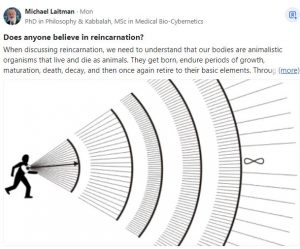
When discussing reincarnation, we need to understand that our bodies are animalistic organisms that live and die as animals.
They get born, endure periods of growth, maturation, death, decay, and then once again retire to their basic elements.
Throughout this animalistic life-and-death process, our internal qualities remain untouched.
These internal qualities are the soul.
The soul can be thought of as a field where we are all connected in a single thought and intention.
The soul’s qualities are omnipresent outside the sights, sounds, smells, touches and tastes that make up our current perception.
Reincarnation is the process of the soul’s appearance in new bodies time and again.
It is a process that Kabbalists have observed and tested for over 5,000 years.
Kabbalists outline the process of reincarnations in their texts that describe the structure and processes of reality.
What Kabbalah adds, however, is not only descriptions about reincarnations and how they function within nature, but more significantly, Kabbalah provides a method by which any person can rise above the corporeal perception of the world—what we perceive and process through the five senses of sight, sound, smell, touch and taste—and enter into the perception and sensation of the eternal soul.
And the most significant aspect about this method is that it is done while the person is alive in their current body.
In other words, Kabbalah explains how reincarnation works not from a theoretical perspective, but from the practice of anybody who wishes to implement its methodology.
While alive in our current bodies, we can learn how to rise above them—in our perception and sensation—in order to discover the soul.
Kabbalah is a practical method that lets any of its students discover such a reality.
Those who progress in their soul’s attainment using the method of Kabbalah attain knowledge about their reincarnations, not merely theoretically, but as practical experience of an inner journey to an increasingly expansive reality.
Featured in Quora